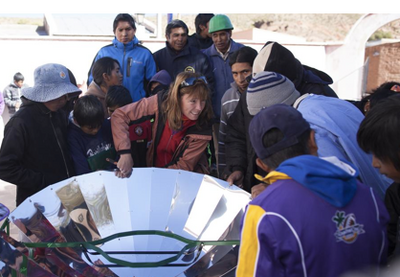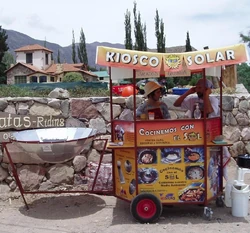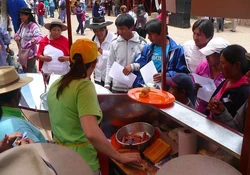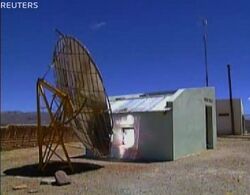Tom Sponheim (talk | contribs) |
Tom Sponheim (talk | contribs) mNo edit summary Tag: sourceedit |
||
| (23 intermediate revisions by 7 users not shown) | |||
| Line 1: | Line 1: | ||
| + | {{GoogleTranslateLinks}} |
||
| + | {{Updated|12|23|14}} |
||
[[Image:EcoAndina_Scheffler_cooker.jpg|thumb|right|400px|This [[Scheffler Community Kitchen]] focuses sunlight on an indoor cooking pot through a hole in the wall.]] |
[[Image:EcoAndina_Scheffler_cooker.jpg|thumb|right|400px|This [[Scheffler Community Kitchen]] focuses sunlight on an indoor cooking pot through a hole in the wall.]] |
||
| − | For many years, '''Fundacion EcoAndina''' has promoted the concept of solar villages in Jujuy province of [[Argentina]]. Among its accomplishments is the distribution of over 250 solar cookers for family use, 23 solar kitchens for community use, and a number of solar water heating and irrigation devices. Fundacion EcoAndina recently partnered with WISIONS, an initiative of the [[Wuppertal Institute for Climate, Environment and Energy]], to “develop a strategy for the optimal use of [[CDM|carbon credits]] to make solar equipment affordable for the users.” The initial step is to use new technology to monitor 50 solar cookers in a field test and assess their CO2 reductions. According to its Web site, Fundacion EcoAndina hopes to “develop local human capacity to handle the carbon market,” and to “build an effective incentive structure for the correct and constant use of solar applications.” |
+ | For many years, '''Fundacion EcoAndina''' has promoted the concept of solar villages in Jujuy province of [[Argentina]]. Among its accomplishments is the distribution of over 250 solar cookers for family use, 23 [[SCK|solar kitchens]] for community use, and a number of solar water heating and irrigation devices. Fundacion EcoAndina recently partnered with WISIONS, an initiative of the [[Wuppertal Institute for Climate, Environment and Energy]], to “develop a strategy for the optimal use of [[CDM|carbon credits]] to make solar equipment affordable for the users.” The initial step is to use new technology to monitor 50 solar cookers in a field test and assess their {{CO2}} reductions. According to its Web site, Fundacion EcoAndina hopes to “develop local human capacity to handle the [[CDM|carbon market]],” and to “build an effective incentive structure for the correct and constant use of solar applications.” |
==News and recent developments== |
==News and recent developments== |
||
| + | [[File:Virginia_Bauso_explains_the_workings_of_the_parabolic_solar_cooker,_12-23-14.png|thumb|400px|Virginia Bauso explains the workings of the [[parabolic solar cooker]] to community members living in remote mountain villages in Argentina. - ''Aljazeera'' ]] |
||
| + | *'''December 2014:''' [[Virginia Bauso]] and the [[Fundación EcoAndina]] have been working to bring viable energy alternatives to communities in the remote mountainous areas of [[Argentina]]. In particular, the community of Misa Rumi. The Fundación EcoAndina began working there in 1989, showing the village how they could harness the sun for their energy needs. Currently, the entire village of Misa Rumi is self-sufficient, producing their own electricity for lighting and heating and cooking with solar cookers. Virginia travels there, and to other surrounding communities to introduce solar cooking technology, and also provide long-term assistance in maintaining the cookers. The young people in Misa Rumi have grown proficient in the operation the solar cookers, and are relived they do not have to spend as much time as their elders gathering scarce firewood. The solar cookers serve the people's immediate needs, but they also take some pressure off the fragile arid environment. Read the article in Aljazeera, and watch the recently produced video documenting their efforts. [http://www.aljazeera.com/indepth/inpictures/2014/12/seizing-solar-power-argentina-20141217141153222494.html Seizing solar power in Argentina] |
||
| + | |||
| + | [[File:Kiosco_SOLAR_cart,_2-27-13.jpg|thumb|250px|The [[Kiosco SOLAR]]]] |
||
| + | [[File:Kiosco_SOLAR_cart_sales,_2-27-13.jpg|thumb|250px|The solar powered food cart has been a success at the Carnival of Puna.]] |
||
| + | *'''February: 2013:''' With help from [[Fundación EcoAndina]] and [[WISIONS Initiative]], there has been a successful launch of solar powered food carts in operation in northern [[Argentina]]. During the celebrations of Carnival of Puna, which spans almost all of February, the intrepid promoters of the sun's energy walked a few new solar kiosks through the streets in Tilcara, Humahuaca, La Quiaca, Purmamarca and Uquía, tourist sites the northern province of Jujuy. Each [[Kiosco SOLAR]] consists of a wheeled trolley, waterproof roof, and a [[parabolic solar cooker]]. "People are incredulous and astonished when the cart is in operation," says Marta Rojas, responsible for opening a kiosk this month in Tilcara. As a safety concern, there has been a need to begin replace traditional food carts, where typically food is cooked directly over gas canisters or open fires. |
||
| + | |||
| + | *'''December 2009:''' {{GoogleLinkFromSpanish|1=http://www.ipsnoticias.net/nota.asp?idnews=94167|2=Pueblos solares se encienden en la Puna|3=IPS}} |
||
| + | |||
[[Image:EcoAndina_reuters_2009.JPG|250px|right]] |
[[Image:EcoAndina_reuters_2009.JPG|250px|right]] |
||
*'''October 2009:''' [http://www.reuters.com/article/lifestyleMolt/idUSTRE59O1O520091025 Solar power gives Andean villages a new lease on life] - ''Reuters'' (Also a [http://www.shoppingblog.com/blog/10310914 Reuters video] shows an [[EcoAndina]] project in the village of Misa Rumi in [[Argentina]] where everything is powered by the sun. Pictured above is the town bakery where 5 kg of bread are cooked every hour.) |
*'''October 2009:''' [http://www.reuters.com/article/lifestyleMolt/idUSTRE59O1O520091025 Solar power gives Andean villages a new lease on life] - ''Reuters'' (Also a [http://www.shoppingblog.com/blog/10310914 Reuters video] shows an [[EcoAndina]] project in the village of Misa Rumi in [[Argentina]] where everything is powered by the sun. Pictured above is the town bakery where 5 kg of bread are cooked every hour.) |
||
| + | |||
*'''August 2008:''' For many years, Fundacion EcoAndina has promoted the concept of solar villages in Jujuy province. Among its accomplishments is the distribution of over 250 solar cookers for family use, 23 solar kitchens for community use, and a number of solar water heating and irrigation devices. Fundacion EcoAndina recently partnered with WISIONS, an initiative of the [[Wuppertal Institute for Climate, Environment and Energy]], to “develop a strategy for the optimal use of carbon credits to make solar equipment affordable for the users.” The initial step is to use new technology to monitor 50 solar cookers in a field test and assess their CO2 reductions. According to its Web site, Fundacion EcoAndina hopes to “develop local human capacity to handle the carbon market,” and to “build an effective incentive structure for the correct and constant use of solar applications.” |
*'''August 2008:''' For many years, Fundacion EcoAndina has promoted the concept of solar villages in Jujuy province. Among its accomplishments is the distribution of over 250 solar cookers for family use, 23 solar kitchens for community use, and a number of solar water heating and irrigation devices. Fundacion EcoAndina recently partnered with WISIONS, an initiative of the [[Wuppertal Institute for Climate, Environment and Energy]], to “develop a strategy for the optimal use of carbon credits to make solar equipment affordable for the users.” The initial step is to use new technology to monitor 50 solar cookers in a field test and assess their CO2 reductions. According to its Web site, Fundacion EcoAndina hopes to “develop local human capacity to handle the carbon market,” and to “build an effective incentive structure for the correct and constant use of solar applications.” |
||
==Audio and video== |
==Audio and video== |
||
| + | *'''2014:''' [http://www.aljazeera.com/programmes/witness/2014/12/seizing-solar-power-2014127132356131176.html Seizing Solar Power - ''Aljazeera''] A documentary of the village of Misa Rumi and their conversion to solar power, from electricity for lighting and heating to solar cookers. The village has become energy self-sufficient. |
||
| − | <youtube>E1UCVQvKtjY</youtube> |
||
| + | |||
| + | ::[[File:Ecoandina (Cientificos Argentinos, 2008) part 1|none|425px]] |
||
==See also== |
==See also== |
||
*[[Scheffler Community Kitchen]] |
*[[Scheffler Community Kitchen]] |
||
| + | *[[Institutional solar cookers]] |
||
==External links== |
==External links== |
||
| − | * |
+ | * {{GoogleLink|http://www.ecoandina.org}} |
| − | * [http:// |
+ | * [http://ecoandina.org/sitio/prensa-y-difusion/fotos/ EcoAndina photo gallery] |
==Contact== |
==Contact== |
||
| − | EcoAndina Argentina<br> |
+ | EcoAndina Argentina<br /> |
| − | Enrique Romero N°43<br> |
+ | Enrique Romero N°43<br /> |
| − | Villa Jardín de Reyes<br> |
+ | Villa Jardín de Reyes<br /> |
| − | San Salvador de Jujuy<br> |
+ | San Salvador de Jujuy<br /> |
| − | Casilla de Correo: 10<br> |
+ | Casilla de Correo: 10<br /> |
[[Argentina]] |
[[Argentina]] |
||
| − | Tel: 0388-4922275<br> |
+ | Tel: (+54) 0388-4922275<br /> |
| − | Fax: 0388-4261229 |
+ | Fax: (+54) 0388-4261229 |
| + | |||
| − | |||
| − | [mailto:ecoandinapuna@yahoo.com.ar ecoandinapuna@yahoo.com.ar]<br> |
+ | Email: [mailto:ecoandinapuna@yahoo.com.ar ecoandinapuna@yahoo.com.ar]<br /> |
| − | http://www.ecoandina.org |
+ | Web: {{GoogleLink|http://www.ecoandina.org}}<br /> |
| + | Facebook: http://www.facebook.com/FundacionEcoAndina |
||
[[Category:NGOs]] |
[[Category:NGOs]] |
||
[[Category:Argentina]] |
[[Category:Argentina]] |
||
| + | [[Category:I2N]] |
||
| + | [[Category:Verified active 2014]] |
||
| + | [[Category:Jujuy]] |
||
| + | [[Category:PSME]] |
||
Revision as of 18:54, 13 November 2015
|
Last edited: 23 December 2014
|

This Scheffler Community Kitchen focuses sunlight on an indoor cooking pot through a hole in the wall.
For many years, Fundacion EcoAndina has promoted the concept of solar villages in Jujuy province of Argentina. Among its accomplishments is the distribution of over 250 solar cookers for family use, 23 solar kitchens for community use, and a number of solar water heating and irrigation devices. Fundacion EcoAndina recently partnered with WISIONS, an initiative of the Wuppertal Institute for Climate, Environment and Energy, to “develop a strategy for the optimal use of carbon credits to make solar equipment affordable for the users.” The initial step is to use new technology to monitor 50 solar cookers in a field test and assess their CO2 reductions. According to its Web site, Fundacion EcoAndina hopes to “develop local human capacity to handle the carbon market,” and to “build an effective incentive structure for the correct and constant use of solar applications.”
News and recent developments

Virginia Bauso explains the workings of the parabolic solar cooker to community members living in remote mountain villages in Argentina. - Aljazeera
- December 2014: Virginia Bauso and the Fundación EcoAndina have been working to bring viable energy alternatives to communities in the remote mountainous areas of Argentina. In particular, the community of Misa Rumi. The Fundación EcoAndina began working there in 1989, showing the village how they could harness the sun for their energy needs. Currently, the entire village of Misa Rumi is self-sufficient, producing their own electricity for lighting and heating and cooking with solar cookers. Virginia travels there, and to other surrounding communities to introduce solar cooking technology, and also provide long-term assistance in maintaining the cookers. The young people in Misa Rumi have grown proficient in the operation the solar cookers, and are relived they do not have to spend as much time as their elders gathering scarce firewood. The solar cookers serve the people's immediate needs, but they also take some pressure off the fragile arid environment. Read the article in Aljazeera, and watch the recently produced video documenting their efforts. Seizing solar power in Argentina

The Kiosco SOLAR

The solar powered food cart has been a success at the Carnival of Puna.
- February: 2013: With help from Fundación EcoAndina and WISIONS Initiative, there has been a successful launch of solar powered food carts in operation in northern Argentina. During the celebrations of Carnival of Puna, which spans almost all of February, the intrepid promoters of the sun's energy walked a few new solar kiosks through the streets in Tilcara, Humahuaca, La Quiaca, Purmamarca and Uquía, tourist sites the northern province of Jujuy. Each Kiosco SOLAR consists of a wheeled trolley, waterproof roof, and a parabolic solar cooker. "People are incredulous and astonished when the cart is in operation," says Marta Rojas, responsible for opening a kiosk this month in Tilcara. As a safety concern, there has been a need to begin replace traditional food carts, where typically food is cooked directly over gas canisters or open fires.
- December 2009: Pueblos solares se encienden en la Puna - IPS
- October 2009: Solar power gives Andean villages a new lease on life - Reuters (Also a Reuters video shows an EcoAndina project in the village of Misa Rumi in Argentina where everything is powered by the sun. Pictured above is the town bakery where 5 kg of bread are cooked every hour.)
- August 2008: For many years, Fundacion EcoAndina has promoted the concept of solar villages in Jujuy province. Among its accomplishments is the distribution of over 250 solar cookers for family use, 23 solar kitchens for community use, and a number of solar water heating and irrigation devices. Fundacion EcoAndina recently partnered with WISIONS, an initiative of the Wuppertal Institute for Climate, Environment and Energy, to “develop a strategy for the optimal use of carbon credits to make solar equipment affordable for the users.” The initial step is to use new technology to monitor 50 solar cookers in a field test and assess their CO2 reductions. According to its Web site, Fundacion EcoAndina hopes to “develop local human capacity to handle the carbon market,” and to “build an effective incentive structure for the correct and constant use of solar applications.”
Audio and video
- 2014: Seizing Solar Power - Aljazeera A documentary of the village of Misa Rumi and their conversion to solar power, from electricity for lighting and heating to solar cookers. The village has become energy self-sufficient.
See also
External links
Contact
EcoAndina Argentina
Enrique Romero N°43
Villa Jardín de Reyes
San Salvador de Jujuy
Casilla de Correo: 10
Argentina
Tel: (+54) 0388-4922275
Fax: (+54) 0388-4261229
Email: ecoandinapuna@yahoo.com.ar
Web: http://www.ecoandina.org (English version)
Facebook: http://www.facebook.com/FundacionEcoAndina


